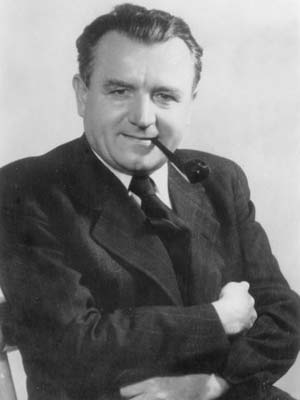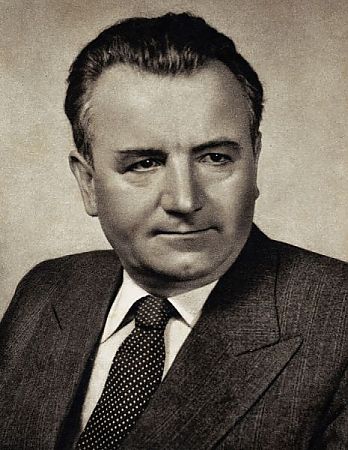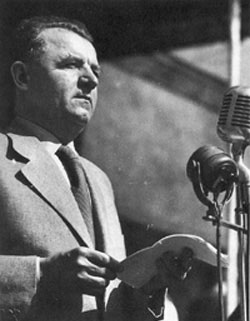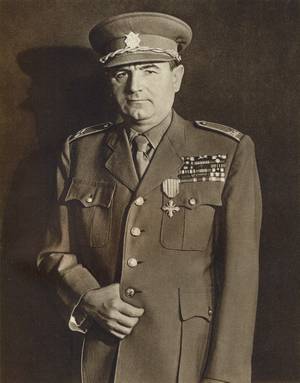<Back to Index>
- President of El Salvador José Napoleón Duarte Fuentes, 1925
- French Revolutionary and Journalist François - Noël Babeuf, 1760
- President of Czechoslovakia Klement Gottwald, 1896
PAGE SPONSOR



Klement Gottwald (23 November 1896 – 14 March 1953) was a Czechoslovakian Communist politician, long time leader of the Communist Party of Czechoslovakia (KSČ or CPCz or CPC), prime minister and president of Czechoslovakia.
Gottwald was born on 23 November 1896, in Dědice, Vyškov, Moravia, Austria - Hungary (now the Czech Republic).
His first career was as a cabinet maker. Subsequently, he was (1921) one of the founders of the KSČ, 1921 – 1926 newspaper editor and KSČ functionary in Slovakia, since 1925 member of the KSČ Central Committee, 1926 – 1929 the leader of the Central Political and Propaganda Committee of the KSČ Central Committee, 1929 – 1948 member of the parliament, 1929 – 1945 Secretary - General of the KSČ, 1935 – 1943 a secretary of the Comintern, 1939 – 1945 one of the leaders of Communist resistance (in Moscow), 1945 – 1953 chairman of the KSČ, 1945 – 1946 Vice Premier, 1946 – 1948 Prime Minister of the Czechoslovak government, 1948 – 1953 President of Czechoslovakia.
In March 1945, Edvard Beneš, who had been elected President of Czechoslovakia 1935 – 38 and who had been head of the Czechoslovak Government - in - Exile in London since 1941, agreed to form a National Front government with Gottwald. Elected to the first Czech post war government following the 1946 election, Gottwald became Premier of Czechoslovakia.
In
May 1946 Klement Gottwald, leader of the communist party, managed to
win the elections with astonishing success with 38% of the votes. This
was the widest electoral success of the communist party recorded until
then.
On 9 May 1948, after the February coup d'état, parliament (the National Assembly) passed a new constitution (the Ninth - of - May Constitution). President Beneš refused to sign the new legislation and he resigned on 7
June 1948 (he died three months later). On 14 June, the National
Assembly elected Klement Gottwald as the new President of
Czechoslovakia.
A Stalinist, he nationalized the country's industry and collectivised its farms. There was considerable resistance within the government to Russian influence on Czechoslovak politics and Gottwald instigated a series of purges, first to remove non - communists, later to remove some communists as well. Prominent Communists who became victims of these purges and were defendants in the Prague Trials included Rudolf Slánský, the party's general secretary, Vlado Clementis (the Foreign Minister) and Gustáv Husák (the leader of an administrative body responsible for Slovakia), who was dismissed from office for "bourgeois nationalism". Slánský and Clementis were executed in December 1952, and hundreds of other government officials were sent to prison. Husák was rehabilitated in 1960s and became Czechoslovak president in 1975.
In the famous photograph from 21 February 1948, described also in The Book of Laughter and Forgetting by Milan Kundera, Vladimír Clementis stands
next to Klement Gottwald. When Vladimír Clementis was charged in
1950, he was erased from the photograph (along with the photographer
Karel Hájek) by the state propaganda department.
Gottwald
died on 14 March 1953, just five days after attending Stalin's funeral
in Moscow on 9 March. His death, due to a burst artery brought about by
prolonged heart disease, was heavily affected by other factors: syphilis and strong alcoholism. His body was initially displayed in a mausoleum at the site of the Jan Žižka monument in the district of Žižkov, Prague. However in 1962 due to a botched embalming, the body had blackened and was decomposing. It was then removed and cremated.
He was succeeded by Antonín Zápotocký, the Premier of Czechoslovakia from 1948 – 1953.
In tribute, Zlín, a city in Moravia, now the Czech Republic, was renamed Gottwaldov after him from 1949 - 1990. Zmiiv, a city in Kharkiv Oblast, Ukrainian SSR, was named Gotvald after him during the years 1976 to 1990.
Námestie Slobody (Freedom square) in Bratislava, Slovakia, had formerly been named Gottwaldovo námestie after him.
In 2005 he was voted the Worst Czech in a ČT poll (a programme under the BBC license 100 Greatest Britons). He received 26% of votes.
